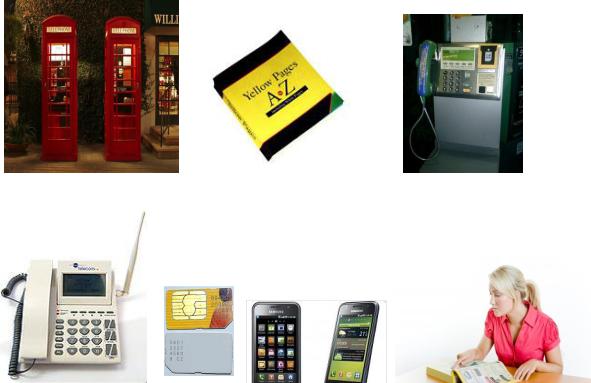
POSIBNIK_1_KURS
.pdf
Now check your answers to the questions given before Text B.
TEXT C: A BARTER WAY OF DOING BUSINESS
Before reading
Can you anticipate what arguments the author will use in favour of a barter way of doing business nowadays?
Reading
The article you are going to read is written by Charlotte Baxter, a subeditor of The Guardian. The author brings up for discussion a project of a barter way of doing business.
(1) Exchanging goods and services without cash is becoming a way of life in parts of Greece. But does it work on a smaller scale?
Here are some baby clothes ... can you fix my washing machine?
(2)Bartering is back. Well, of course the direct exchange of goods and services championed by Aristotle never went away, but in these straitened times, old practices are being reinvigorated using modern tools.
(3)As the main form of exchange, it's a bit of a palaver. Imagine going to the market looking for a sack of grain, you have to exchange your two chickens for a small pig, swap that for a nice shrubbery and take it to a local grain farmer who
271
just happens to be doing up his garden. Currency was always going to look more
appealing.
(4)But barter still has its place alongside the mainstream, particularly in the midst of an economic crisis. A shortage of cash or an unstable currency can drive alternative local economies – barter schemes are becoming a way of life in parts of Greece and time banks, in which people exchange units of their own time instead of money, have exploded in popularity with the unemployed in parts of Spain.
(5)According to the International Reciprocal Trade Association (IRTA), governments such as China, France and Ireland are considering launching statesponsored barter schemes. Bartercard, a bartering organisation for small and medium enterprises, has more than 35,000 members and many companies have exchange mechanisms in place. The IRTA says that 30% of business worldwide is done on a barter basis – Mercedes Benz bartered buses for bananas in a deal worth $65m, and Pepsico had a long-running Russian deal in which it swapped cola for Stolichnaya vodka.
(6)But does it work on a smaller scale? Say, I need to find someone to fix my washing machine. LETs schemes, which focus on the exchange of labour, always seemed like a useful sideline to the formal monetary system – but after 30 years of service they are in decline. There's a limit to what a city-dweller working in the "knowledge economy" (in which you use your head, not your hands) can offer their local plumber, and these community schemes work on the basis of credits that people often find difficult to use. As a subeditor, I could proof-read your novel, perhaps, or check the punctuation on your advertising hoarding. It's not in quite the same league as an electrician's ability to prevent your untimely death by toaster.
(7)And what about using all those baby clothes in the loft? Several websites facilitate exchanges - Craigslist, U-Exchange and Gumtree have thriving barter markets. One new site, One Fair Market, focuses solely on direct trade. Swap oranges for shoes, it suggests, perhaps rather optimistically. The site is still in its infancy, but it's a good example of the way the internet is offering international reach to local exchanges, reinvigorating the concept in the process.
272
(8)Most modern barter systems involve some form of currency, or credit, substituted for money, avoiding the main problem with direct exchange – finding someone with grain who wants chickens. But what U-Exchange calls "reciprocal barter" (direct exchange), can offer better value for local schemes as you are directly swapping goods of far higher worth to each individual – once the goods are pooled, their value declines relatively. Kyle Macdonald famously turned a paperclip into a house by trading up, but as one barter fanatic points out, trading up in pure monetary terms isn't really the point – it's to acquire something that has more value to you personally than whatever you're selling.
(9)This means, advocates suggest, that you always do better than if you'd just sold it for cash. And then there's the personal touch, the idea that you're cutting out big business to exchange directly with your fellow man in an ancient ritual that helps you feel closer to your community.
(10)Some might advocate getting rid of money altogether but I think the cash genie might prove a little too vast – I'll settle for offering all my old baby gear to
someone … Any new parent plumbers out there?
Guardian.co.uk, 4 January 2013
After reading
Task 1. Discuss what Charlotte Baxter meant saying that “bartering is back again.” (para.
1)
Task 2. The author of the article considers that “a shortage of cash or an unstable currency can drive alternative local economies – barter schemes are becoming a way of life.” (para.4) Do you share her viewpoint? If not, why?
Task 3. Divide into groups of advocates and opponents of the idea of doing business by bartering and discuss the matter. Ask questions, agree or disagree with your opponent, argue in favour of your position.
The following is given to you as an example. |
|
Advocates (supporters) |
Opponents |
In the midst of economic crisis, bartering |
The project seems strange and vulnerable. |
273

enables people to, at least economically, communicate with each other, if not the rest of the world, which is better than the stagnation and wasted capacity of no means of economic communication at all.
Bartering is, in my opinion, a healthy way to recycle, reuse and get in touch with your community, and that is why I decided to start the OneFairMarket.com project.
Wouldn’t barter lead to less tax being paid? Can the tax be calculated and paid without using £ or $ signs?
BUSINESS COMMUNICATION
On the phone
Look at the following pictures. What do you think symbolizes Britishness?
Is there anything more British than red telephone boxes? Like giant red soldiers, they have been a landmark for a lifetime.
Read the words and expressions in the box below. Can you add anything else to this list?
274

telephone box (Am.- tel. booth), telephone directory, phone card, (tele)phone number, answering machine/answer phone, mobile phone (Am. cellphone), telephone handset, videophone;
to telephone /phone/call/ring somebody, dial a phone number, answer/get the phone, be wanted on the phone, talk on the phone, hang up
Ex.1. Read the telephone numbers.
097 577 4261, 067 732 0455, 863 451 2779, 340 366 7875, 831 6745, 561 5775
Say numbers separately. Make a pause between groups. Say oh for 0 if you are in the UK and zero in the USA. Say double seven for 77, double five for 55, etc.
You write |
You say |
037 801 6233 |
oh-three- seven eight-oh-one six-two- double three |
Ex.2. Work in pairs. One student asks the caller for his telephone number and area code, the other student responds.
Can I take your number, please? – Sure. It’s _______________.
What is the code for Ukraine/Great Britain/the USA? – It’s ______.
The code for Kyiv is 044, right? - Yes, it is.
Ex.3. In pairs, read the mini-dialogue. Then make up your own telephone talk and roleplay it.
|
Inquiring about the telephone number |
Operator: |
Information.* Can I help you? |
Mr. Dodge |
Could you please give the telephone number of the sales |
|
department at ABC Electronics? |
Operator |
Just a moment, sir. The number is 357 34 52. |
Mr. Dodge |
Three-five-seven three-four fifty-two. Is it right? |
Operator: |
That’s right. |
Mr. Dodge |
Thank you very much. |
* In business, the telephone is answered by giving the name of the firm.
Ex.4. Study the structure of a business telephone talk. As a rule, phone communication
includes the following:
275
Steps taken by the person who
answers the telephone
Phone rings. The switchboard operator or receptionist
1.identifies the company and greets the caller;
2.asks for the caller’s identification and the reason for the call;
3.offers to take a message if necessary.
Caller’s steps
He greets the switchboard operator; asks the operator to connect him to the person he needs;
identifies himself;
explains the reason for his call and, if necessary, leaves a message.
If the person who was called answers the telephone, he identifies himself, greets the caller and then discusses the matter.
At the end of the talk, he summarises what they’ve discussed,
says polite formulae, says goodbye
If the person needed answers the telephone himself, the caller greets him,
introduces himself, explains the reason for the call, states the problem and discusses the matter.
The caller summarises what they’ve discussed, says polite formulae and
says good-bye.
Ex.5. Put the following extracts of telephone calls into the correct order.
-Just a moment, Mr. Berston, I’ll put you through.
-Oh, good morning. Could I speak to Mr. Larson, please?
-My name is Paul Berston. I’m from Plant Installation Limited.
-Yes. Who’s calling, please?
-ABC Electronics. Good morning. Can I help you?
-He’s got it, but just in case, it’s 097 253 466.
-Yes, could you ask him to call me back?
-Mr. Dorsan here. Could I speak to Mr. Shelton, please?
-Yes, of course. Could I have your number?
-I’m afraid he’s out at the moment. Can I take a message?
276
Ex.6. Look at the language used in telephone communication. It is not always the same as when we are face to face with a person. Compare:
Face to face |
On the telephone |
What’s your name? |
Could I have your name, please? |
- I’m John Brown. |
- This is John Brown. |
Are you Mr. Brown? - Yes, I am. |
Is this Mr.Brown? - Speaking. |
Could you wait a moment? |
Hold the line, please. / Hold on a minute. |
Now read the following and choose the phrases you think appropriate and correct for telephone conversation. Sometimes two variants are possible.
1.When you want to contact somebody, you can say:
a.Let me talk to Mr. Croft.
b.Can/Could I speak to Mr. Croft, please?
2.When you want to ask who is calling you, you can say:
a.Who are you?
b.Who’s calling/speaking, please?
c.Can/May I ask who’s calling, please?
3.If you answer the phone and offer your help, you can say:
a. May/Can I help you? b. What do you want?
4.When you ask someone on the phone to wait, you can say:
a.One moment, please.
b.Hello, wait.
c.Hold on a moment, please.
Ex.7. Choose the correct response.
|
a) Tracy Brighton speaking. |
1. Who’s calling, please? |
b) I’m Tracy Brighton. |
|
c) Oh, this is Tracy Brighton. |
277

|
2. Can I take a message? |
|
(Would you like to leave a |
\ |
message?) |
|
3. The reason I’m calling you is we're having problems.
4. Could you manage Monday? (Could we meet on
Monday, say, at 10 o’clock?)
a) Please tell him to call me back.
c) Yes, could you ask him to call me back, please?
a) Really? That surprises me./ I’m sorry to hear that.
b)I don’t believe it.
c)I don’t mind.
a)No, I can’t.
b)No.
c)I’m afraid I can’t. Could we fix another time?
|
a) I’m afraid that’s out of the |
5. So that’s fixed – Tuesday |
question. |
at 10.30. |
b) Good. See you on Tuesday. |
|
c) Bye. |
278

6. Sorry, Sophie. I’ve got to |
a) That’s all then. |
go to a meeting now. c) Oh, that’s OK. I’ll be in touch
soon. Bye.
d) OK. Talk to you soon, no doubt.
Bye.
Ex. 8. Identify and correct the mistakes in the sentences and substitute those which are not
appropriate for a telephone conversation.
1.Give me James, please.
2.The line is occupied.
3.Please can you wait on the line?
4.I’m frightened Mr. Ellington isn’t here at the moment.
5.Do you want me to tell him something?
6.Can I give a message, please?
7.Could you ask him to call to me back?
8.Could you just tell to her that I called?
9.One moment, please. I’ll just put through you to one of his colleagues.
10.I’m Katy Darley speaking.
Ex. 9. Fill in the missing remarks. Refer to the box of useful language if necessary.
a)
-Rockline Safety Equipment. Good morning. Can I help you?
-_________________________________________
-Yes. Who’s calling, please?
b)
-_________________________________________
-Oh good morning. Can I speak to Mr. Benson, please?
-_________________________________________
-This is Mathew Brown, from GST Systems.
-Right, Mr.Brown. I’ll ________________________
c)
-Sorry, Madam. Mr. Roberts is not available.
-_________________________________________
-No, thank you, I’ll call back later.
279
d)
-Just a minute. I’ll see if he is in. Sorry, he is in the middle of a meeting now. Could he call you back?
-_________________________________________
e)
-I’m sorry. I can’t hear what you’re saying. Could you speak up, please?
-_________________________________________
f)
-Sorry, Charles. I’ve got to go and see someone.
-OK. ____________________________________
g)
-Nice talking to you. See you on Friday.
-Thanks for ________________________________
h)
-I’m afraid you’ve got the wrong number.
-_________________________________________
-That’s all right.
Ex.10. Complete this telephone conversation and then role-play it.
Secretary: Good morning, Somerset Industries.
Mr. Gross: Hello. _______________________________________.
Secretary: |
I’m sorry. She’s not in. Would you like to leave a message? |
Mr. Gross |
Yes, ____________. This is _______________________. |
Secretary: |
Is that C-R-O-S-S? |
Mr. Gross: |
No, it’s ________________________________________. |
Secretary: |
All right. |
Mr. Gross: |
Please tell her the meeting __________________________. |
Secretary: |
I see. Wednesday at _______________________________. |
Mr. Gross: |
Right. And would you ask her _______________________. |
Secretary: |
356 40 31. Yes, Mr. Gross. I’ll give Ms Jones the message. |
Mr. Gross: |
_______________________________________________. |
Secretary: |
Goodbye. |
Ex.11. Practice making telephone calls. Refer to the box of useful language.
Situation 1
280
